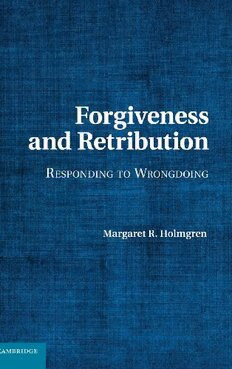Table Of ContentForgiveness and Retribution
Responding to Wrongdoing
Forgiveness and Retribution: Responding to Wrongdoing argues
that, ultimately, forgiveness is always the appropriate response to
wrongdoing. In recent decades, many philosophers have claimed
that unless certain conditions are met, we should resent those who
have wronged us personally and that criminal offenders deserve to be
punished. Conversely, Margaret R. Holmgren posits that we should
forgive those who have ill-treated us, but in many cases, only after
working through a process of addressing the wrong. Holmgren then
reflects on the kinds of laws and social practices a properly forgiving
society would adopt.
Margaret R. Holmgren is associate professor of philosophy at Iowa
State University. She co-edited Ethical Theory: A Concise Anthology
(2000) with Heimir Giersson.
“Margaret Holmgren’s book is a daring attempt to defend a new para-
digm of forgiveness that would radically reorient our attitudes toward
those who wrong us and our way of thinking about punishment and
criminal law. No doubt the discussion it provokes will be intense.”
– George W. Harris, author of Reason’s Grief: An Essay
on Tragedy and Value
“Moral, political, and legal philosophers who prize theoretical unity
and comprehensiveness will appreciate Margaret Holmgren’s new book,
which begins with a foundational virtue ethic and from it systemati-
cally derives conclusions about how individuals and institutions should
respond to wrongdoers. Holmgren’s work is probably the most thought-
ful and thorough defense of an unconditional forgiveness approach to
wrongdoers, one that critically responds to work by contemporary retrib-
utivists and that should give them pause. Of particular interest is the fact
that Holmgren argues that principles such as respect for offenders and for
victims, to which retributivists standardly appeal, are best interpreted in
ways that support anti-retributivist conclusions, such as the restitutional
approach to punishment for which Holmgren is rightly well-known.”
– Thaddeus Metz, Humanities Research Professor,
University of Johannesburg
“Margaret Holmgren has written a very stimulating book on forgive-
ness. . . An additional virtue of her book is a discussion of forgiveness in
the context of criminal punishment – a discussion in which she makes
creative suggestions concerning the social and legal institutions that a
truly forgiving society would adopt. I recommend that all those interested
in a serious discussion of forgiveness read this book and ponder its many
insights.”
– Jeffrie G. Murphy, Arizona State University, author
of the book Getting Even: Forgiveness and Its Limits
Forgiveness and Retribution
Responding to Wrongdoing
MaRgaRet R. HolMgRen
Iowa State University
cambridge university press
Cambridge, New York, Melbourne, Madrid, Cape Town,
Singapore, São Paulo, Delhi, Mexico City
Cambridge University Press
32 Avenue of the Americas, New York, ny 10013-2473, usa
www.cambridge.org
Information on this title: www.cambridge.org/9781107017962
© Margaret R. Holmgren 2012
This publication is in copyright. Subject to statutory exception
and to the provisions of relevant collective licensing agreements,
no reproduction of any part may take place without the written
permission of Cambridge University Press.
First published 2012
Printed in the United States of America
A catalog record for this publication is available from the British Library.
Library of Congress Cataloging in Publication data
Holmgren, Margaret R. (Margaret Reed), 1951–
Forgiveness and retribution : responding to wrongdoing / Margaret R. Holmgren.
p. cm.
Includes bibliographical references and index.
isbn 978-1-107-01796-2 (hardback)
1. Forgiveness. 2. Conduct of life. 3. Retribution. 4. Criminal
justice, Administration of. I. Title.
bj1476.h65 2012
155.9′2–dc23 2011032288
isbn 978-1-107-01796-2 Hardback
Cambridge University Press has no responsibility for the persistence or accuracy of urls
for external or third-party Internet Web sites referred to in this publication and does not
guarantee that any content on such Web sites is, or will remain, accurate or appropriate.
For my sister, Janet W. Holmgren
In memory of my mother, Jean Dunn Robb, and of Campbell
Contents
Preface page ix
1 Introduction and Overview 1
2 The Nature of Forgiveness and Resentment 23
Attitudes and Character Traits 23
The Attitudes of Forgiveness and Resentment Defined 29
Controversial Aspects of the Nature of Forgiveness 35
3 The Moral Analysis of the Attitudes of Forgiveness
and Resentment 51
Three Approaches to the Moral Analysis of Forgiveness 51
The Process of Addressing the Wrong 58
Divergence of the Paradigm of Forgiveness and
Attitudinal Retributivism 64
Forgiveness, Resentment, and Self-Respect 66
Forgiveness, Resentment, and Respect for Morality 75
Forgiveness, Resentment, and Respect for the Offender 84
4 The Moral Analysis of the Attitudes of Self-Forgiveness
and Self-Condemnation 104
The Attitudes of Self-Forgiveness and Self-Condemnation
Defined 104
The Process of Addressing the Wrong 107
Divergence of the Paradigm of Forgiveness and
Attitudinal Retributivism 111
Self-Forgiveness, Self-Condemnation, and Respect
for the Victim 112
vii
viii Contents
Self-Forgiveness, Self-Condemnation, and Respect
for Morality 120
Self-Forgiveness, Self-Condemnation, and Respect
for Ourselves 123
5 Philosophical Underpinnings of the Basic Attitudes 134
The Paradigm of Forgiveness and the Equal Moral
Status of Persons 134
The Paradigm of Forgiveness and Personal Identity 146
The Paradigm of Forgiveness and Moral Responsibility 157
6 Moral Theory: Justice and Desert 164
Basic Attitudes and Moral Theories 166
Moral Theories Structured in Terms of Desert 170
The Paradigm of Forgiveness, Justice, and Desert 182
7 The Public Response to Wrongdoing 193
Prevention of Wrongdoing and Other Kinds of
Damaging Behavior 196
Restitution for Primary Harm 205
Retributive Theories of Punishment 210
Restitution for Secondary Harm 228
8 Restorative Justice: The Public Response to Wrongdoing
and the Process of Addressing the Wrong 257
The Needs of the Victim 258
The Needs of the Offender to Gain Reacceptance
into the Community 261
The Offender’s Responsibility to his Victims 262
Leaving Matters of Justice for Citizens to Sort Out
for Themselves 262
Constructive Solutions to Crimes 273
Conclusion 276
Works Cited 279
Index 287

